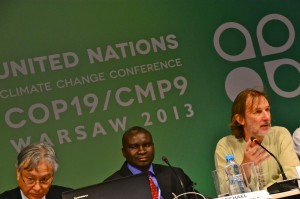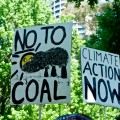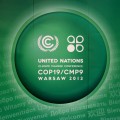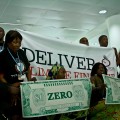COP19 – Day Seven
Kahil Lloyd | November 20, 2013.
Week two is upon us, and you can tell who’s just arrived and who feels like this has become their life.
Discussions in the halls were dominated by an event not even occurring within the conference centre. Less than three kilometres away, business and industry associates were meeting for the International Coal and Climate Summit. This event has received considerable media attention, in part due to UNFCCC Executive Secretary Christiana Figueres’ divisive attendance, and the avid support the event has received from the Polish Government. Greenpeace activists scaled the building and unfurled a large banner to express their disapproval of the event coinciding with the climate talks. The banner read: “Who Rules the World? Fossil Industry or the People?” Unperturbed, Figueres attended the event.
Figueres was frank in her speech, not only addressing recent criticism directed at her from NGOs, but also delivering some hard truths to the coal industry. “Let me be clear from the outset that my joining you today is neither a tacit approval of coal use nor a call for the immediate disappearance of coal,” Figueres said, “but I am here to say that coal must change rapidly and dramatically.” Did Figueres silence her critics? Probably not. But she is an international diplomat and her point that climate action requires broad support across society for system change has merit.
Here’s what else happened:
To the visible relief of chair Chruszczow, SBI finally closed in the early afternoon. Decisions have been forwarded for approval. The contentious issue about the UNFCCC budget for the next year is still undecided, and will be discussed further this week by ministers. Chruszczow stated that progress has been made on the issue of loss and damage, and finance, but these issues need a political not a technical response. Read: it’s outside the ambit of SBI.
After SBI closed, COP President Korolec convened an informal stocktaking plenary to discuss progress so far with parties and observers. Like most sessions, it started late. “Work is progressing smoothly” said Korolec, but did anyone believe him? The chairs from the two subsidiary bodies – SBI and SBSTA – reported back to the plenary. Both explained that their respective work has now concluded, with decisions being forwarded to the COP and CMP for decision.
The environmental integrity group reiterated its position that the talks in Warsaw must lay the foundations for an agreement post-2020, but also reminded parties of the urgent need to address pre-2020 ambition. Parties seem to be talking a lot about pre-2020 ambition at Warsaw, but with Japan revising their ambition substantially down and Australia sending signals that it will barely meet its five per cent target, is this going to be a likely outcome in Warsaw? Certainly doesn’t seem like it.
The ADP co-chairs compiled a draft text, the first that we’ve seen here, and convened an open-ended consultation in the afternoon. Parties seem to agree that they don’t like it, and that’s about it. The G77+China has concerns over the lack of equity and loss and damage in the text. Swaziland, on behalf of the Africa group, described the text as a “very good version zero,” and called on parties to increase ambition. The co-chairs intended the text to be “merely indicative,” but with so much disagreement, it is hard to see this stream coming up with a substantial outcome in Warsaw.
The ministers have arrived, and they have their work cut out for them. With some very political issues to discuss, including the roadmap for the 2015 agreement, long-term and short-term climate finance, and loss and damage, many observers are hoping that the ministers can break the impasse and deliver a substantial outcome.
By Kahil Lloyd, photo by CGIAR Climate.














comment